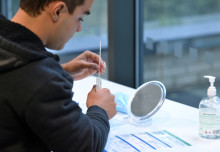

Two Imperial academics recognised for their excellence in medical science <em> - News </em>
See also...
External sites:
(Imperial College is not responsible for the content of these external internet sites)
Two Imperial academics have been recognised for their excellence in medical science with election to the Fellowship of the Academy of Medical Sciences. Philippe Froguel , Chair in Genomic Medicine, and Neil Brockdorff , Professor of Genetics, joined the Academy on 30 April along with thirty eight other leading UK doctors and medical researchers.
Professor Neil Brockdorff started his independent research career as a group head at the MRC Clinical Sciences Centre when it was established on Imperial's Hammersmith Hospital Campus in 1994. He was awarded an honorary Chair in Genetics at Imperial in 2001.
Professor Brockdorff's research focuses on understanding gene regulation during the development of an adult animal from a newly fertilised egg. In particular he has studied X chromosome inactivation, a process in which one of the two X chromosomes in female mammals is silenced during early development.
Key contributions from his lab include pioneering work defining the role of the non-coding RNA Xist, which coats the inactive X chromosome, in regulating X inactivation. His current efforts are directed towards understanding how this unusual RNA interacts with gene silencing factors such as the histone proteins around which DNA is wrapped.
Professor Brockdorff said of his Fellowship: "Being elected to the Academy of Medical Sciences is a great honour. The academy has considerable influence on science policy in the UK and I hope to be able to contribute my views on key issues such as the present debate on the importance of translational versus basic science.
"I believe that it is an excellent idea to expand our efforts to translate scientific discovery but at the same time that we should be very careful not to kill the goose that lays the golden eggs, top quality curiosity driven basic research. In fact, to continue the analogy, we should fatten up the goose. Ultimately it is innovation that drives wealth creation," he added.
Professor Philippe Froguel's career is focused on finding explanations for obesity and Type 2 diabetes using human genetic approaches. In February this year Professor Froguel was part of the team that identified some of the most important genes associated with a risk of developing Type 2 diabetes, in the journal Nature. He joined Imperial in 2003, when he was appointed to the Chair of the section of Genomic Medicine. Professor Froguel is also the theme leader in Endocrinology, Diabetes and Metabolic Diseases.
Speaking of his Fellowship, Professor Froguel, from the Division of Medicine, said: "I am very proud and in some respects surprised that my new British colleagues have elected a newly-established-in-London, French researcher at this very prestigious institution. It is also a recognition of the excellence of medical research in genetics and metabolism at the Imperial College Faculty of Medicine."
The Academy of Medical Sciences, which now has 881 members, promotes advances in medical science and campaigns to ensure these are translated as quickly as possible into healthcare benefits for society.
-ends-
Article text (excluding photos or graphics) available under an Attribution-NonCommercial-ShareAlike Creative Commons license.
Photos and graphics subject to third party copyright used with permission or © Imperial College London.





